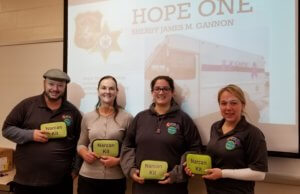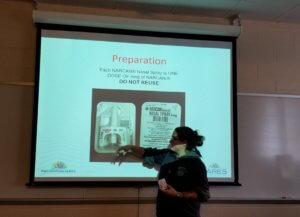Morris County Sheriff's Office Hope One Team Addresses Opioid Epidemic and Narcan's Live-saving Use with County College of Morris Students
Published on June 01, 2019
Students of a Criminal Justice System class at County College of Morris were given a candid presentation on how to use Narcan to reverse an opioid-induced overdose and how the Morris County Sheriff's Office Hope One program is committed to reducing substance use disorders.
 From left, Mental Health Association of Essex and Morris Clinician Al Shurdom, County College of Morris Professor Dr. Maureen Kazaba, CARES Peer Recovery Specialist Carrie Bailey, Morris County Sheriff's Office Corporal Erica Valvano, who manages the Sheriff's Hope One program.
From left, Mental Health Association of Essex and Morris Clinician Al Shurdom, County College of Morris Professor Dr. Maureen Kazaba, CARES Peer Recovery Specialist Carrie Bailey, Morris County Sheriff's Office Corporal Erica Valvano, who manages the Sheriff's Hope One program.
At the request of CCM Criminal Justice Professor Dr. Maureen Kazaba, a Hope One team “ Morris County Sheriff's Office Corporal Erica Rice, Mental Health Clinician Al Shurdom and Certified Peer Recovery Specialist Carrie Bailey “ on December 5 gave an overview of the award-winning Hope One program that has made nearly 10,000 contacts since its launch on April 3, 2017.
Clinician Shurdom works for the Mental Health Association of Essex and Morris and Specialist Bailey works for the Rockaway-based Center for Addiction Recovery, Education & Success (CARES). Along with Daytop-New Jersey, Prevention is Key and the Morris County Department of Human Services, CARES and the Mental Health Association are partners in Hope One with the Morris County Sheriff's Office.
Both Specialist Bailey and Clinician Shurdom were forthright in telling the students how they struggled to manage their respective disorders and find strength in helping others overcome what can be viewed by many as an impossible hurdle. Clinician Shurdom said shame, fear, machismo and false bravado are all common feelings that can block a person from seeking help.
 CARES Peer Recovery Specialist Carrie Bailey walks CCM students through the steps of using Narcan to revive a person overdosing on opioids.
CARES Peer Recovery Specialist Carrie Bailey walks CCM students through the steps of using Narcan to revive a person overdosing on opioids.
While Corporal Valvano manages the Hope One mobile substance use resource and recovery program as a plainclothes Sheriff's Officer, Specialist Bailey provides Narcan training and Clinician Shurdom helps people struggling with mental health disorders navigate services.
I'm a living, breathing example of ˜there is hope on the other side,' Clinician Shurdom said. Ask for help. It's the opposite of weakness.
Before instructing students on how to administer Narcan to an overdosing individual through a nostril, Specialist Bailey detailed the signs of an overdose and simple steps to take: Call 911, give several rescue breaths to the individual, then administer the nasal spray.
Always alert medical professionals, she said, because the Narcan dose will wear off in a half-hour to 45 minutes and opioids can reattach to the brain, triggering another overdose. Under New Jersey's Overdose Prevention Act, witnesses and victims are protected from arrest, she said.
In stark terms, Specialist Bailey described how individuals revived from an overdose can turn combative since they spent money on opiates and wanted to enjoy a high while indifferent to the risk of overdose.
The students were provided with free Narcan kits from CARES, which contain one, 4 milligram dose of Naloxone (Narcan), and a plastic mouth shield for use in rescue breathing. Even if the students don't personally know anyone with an opioid addiction, the kits are invaluable for use on anyone overdosing, including in public restrooms, Specialist Bailey said.
 Mental Health Association of Essex and Morris Clinician Al Shurdom urges CCM students to seek help if they are depressed or believe they have another mental health disorder.
Mental Health Association of Essex and Morris Clinician Al Shurdom urges CCM students to seek help if they are depressed or believe they have another mental health disorder.
Coincidentally, the latest publication of the CCM student newspaper, The Youngtown Edition, contains a student-written story about how a relative is snared in a trap of heroin addiction.
Corporal Valvano gave students an overview of how Morris County Sheriff James M. Gannon creatively forged partnerships with non-profit organizations and used $15,000 in drug forfeiture money to turn a defunct Sheriff's Emergency Response Team (SERT) van to the Hope One mobile program.
As of December 5, Hope One teams have made 370 stops, mostly in areas where overdoses are documented as occurring and where homeless and at-risk individuals are known to congregate. But Hope One frequently also is present at large events, festivals, and in shopping districts that draw people of all backgrounds.
Among other services, Hope One teams have trained 2,135 people in Narcan administration, assisted 155 people into recovery or rehab programs, and guided another 121 people to mental health services.
Corporal Valvano stressed to students that Hope One's approach is non-aggressive and non-judgmental. Coffee, snacks and toiletries are offered to people who approach the distinctive white and purple van. Conversations start, and some visitors leave while others stay, for Narcan training or to talk about a relative or someone they know who is battling a substance use disorder.
It's about building rapport, Corporal Valvano said.